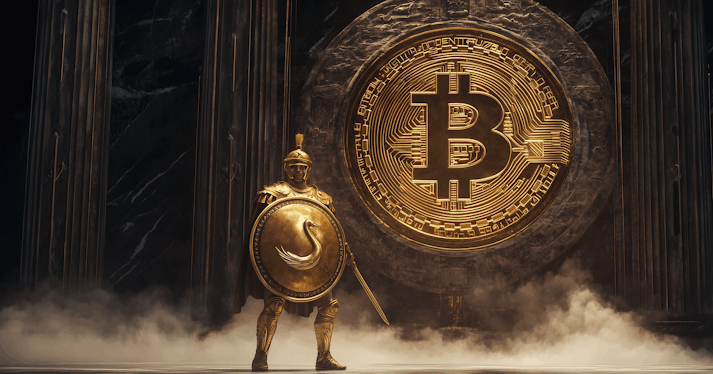This article from December 28th, 2022 by Stephan Livera was originally published on Bitcoin Magazine.
There are metaphors and analogies for Bitcoin that you may have heard on podcasts or read from various articles or books — and this is not meant to criticize the entire practice of using metaphors or analogies to pique people’s interest in Bitcoin — but having a bad framework for understanding Bitcoin can cause errors in how we reason about it from there. If people take the metaphors too literally, they inevitably make mistakes in their reasoning about Bitcoin.
First, let’s consider this quotation on whether all metaphors are wrong:
“For it would be an absurd undertaking to banish from the language of economic theory every manner of speaking that is not literally correct; it would be sheer pedantry to proscribe every figure of speech, particularly since we could not say the hundredth part of what we have to say if we refused ever to take recourse to a metaphor. One requirement is essential, that economic theory avoid the error of confusing a practical habit, indulged in for the sake of expediency, with scientific truth.”
– Eugen von Bohm-Bawerk
So, clearly, not all analogies are harmful. But the metaphor can’t be confused with the real scientific truth when striving for accuracy.
‘BITCOIN IS STORED TIME’
The popular notion that Bitcoin can “store our time” is an overly loose and imprecise metaphor. It typically comes up when Bitcoiners talk about the injustice of fiat currency (this part is correct). Still, it goes awry when the analogy is stretched too far into suggesting that we should “store our time” in Bitcoin instead of fiat currency.
The “store of value” concept can apply to Bitcoin if we consider longer time frames, but it’s not storing time. As the saying goes, time waits for no man. We speak in loose terms such as economizing time or “saving time, ” but really, time itself is not what we economize; it’s how we spend our time. The preference is in the doing. Or, as my podcast guest Conza recounted from a conversation with Konrad Graf, “Go ahead, try not to spend some time and save it for later instead.”
Even when equivocating bitcoin as purchasing power, which may be the spirit of the analogy, it is important to remember that there are no guarantees here. Bitcoin’s purchasing power has decreased over selected time frames, which is where thinking of Bitcoin as stored time can lead a person astray if taken too literally.
Now, a shout out to my friend Gigi, who has written on the concept of Bitcoin as building out an arrow of time. This concept does make sense, and it helps to explain why Bitcoin is designed the way it is — by keeping time using blocks instead of seconds and not relying on a centralized timekeeper. This is distinct from the incorrect metaphor of “Bitcoin as storing your time.” So, a more accurate framing would be that Bitcoin keeps time (using blocks, not seconds), but it does not store your time.
BITCOIN AS ENERGY/BATTERY
Some people speak of Bitcoin as digital energy or as though it is a battery. But remember, while Bitcoin miners use energy, Bitcoin still does not allow anyone to store or transport energy. There is no central counter to which we can take our Bitcoin and redeem it for a set amount of energy. Yes, energy could be priced and sold for Bitcoin, but that’s not the same thing. The energy price will fluctuate, and Bitcoin will not even metaphorically store the same amount of energy over time.
What error can this lead to? It can mislead people about where the value is coming from. This metaphor leads people toward a kind of cost theory of value, effectively putting the horse before the cart. Instead, we should reason from the subjective theory of value:
“The value of a good is not determined by any inherent property of the good, nor by the amount of labor required to produce the good, but instead value is determined by the importance an acting individual places on a good for the achievement of their desired ends.”
A related cousin of this is the notion that Bitcoin is “backed by” energy. Typically, this comes up when a nocoiner says, “But Bitcoin isn’t backed by anything.” So, in some cases, a well-intentioned but wrong Bitcoiner may say, “No, Bitcoin is backed by energy!” But this is wrong.
Generally, when something is “backed by” something else, it implies that it somehow has the support of some other entity, like a government. Historically, people say the U.S. dollar was “backed by” gold, and people could historically redeem notes for gold, but no such thing exists with Bitcoin. So, perhaps a better question to ask is, “What’s gold backed by?” Only then are we getting to the truth of the matter: it was all subjective valuation all along. Beauty is in the eye of the beholder.
BITCOIN AS VIOLENCE OR A ‘WEAPON’
Some people want to frame Bitcoin as a kind of “digital violence” or, more recently, frame it as a weapon and part of a “soft war protocol.” But this is a gross misrepresentation of what Bitcoin is. Bitcoin is more like cryptographic messages being passed around and validated on a network. Surely that is closer to “speech” than a “weapon.” Or, more accurately, Bitcoin can be considered a rivalrous digital commodity (the first of its kind) operating on an open-source monetary network.
If the pen is mightier than the sword, would it be appropriate to call a pen a weapon? Not really. Also, this whole line of argument clearly blurs the line between what’s voluntary and what is initiating aggression (which is the wrong part). How is running a node, adopting Bitcoin as a rivalrous digital commodity, and participating in the network a form of “weaponry?” This is just gross mischaracterization. Words mean things.
Some analogies and metaphors used about “Bitcoin as soft war protocol” relate to miners competing to secure the “chain of custody.” But do they? Or is it really more like Bitcoin nodes are what secure Bitcoin? Miners can’t make invalid transactions appear valid to those who verify transactions with their own Bitcoin node. So, isn’t it more relevant to think of it like nodes securing Bitcoin? Miners' jobs are important, but they are more related to the finality of transactions, not security.
SO, WHAT IS THE REAL TRUTH THEN?
So, as mentioned earlier, economically speaking, bitcoin is more accurately characterized as a rivalrous digital commodity. Bitcoin is the commodity itself — it’s not a claim on something; it is the commodity itself. When people ask what it is backed by, this indicates they haven’t quite grasped what it is.
If an analogy helps a new person get into Bitcoin and start going down the rabbit hole, that’s great! But as that person advances their knowledge about Bitcoin, additional precision about what Bitcoin is will help us all.
Thanks to my friend Conza for inspiring this article and providing feedback.
Swan IRA — Real Bitcoin, No Taxes*
Hold your IRA with the most trusted name in Bitcoin.









